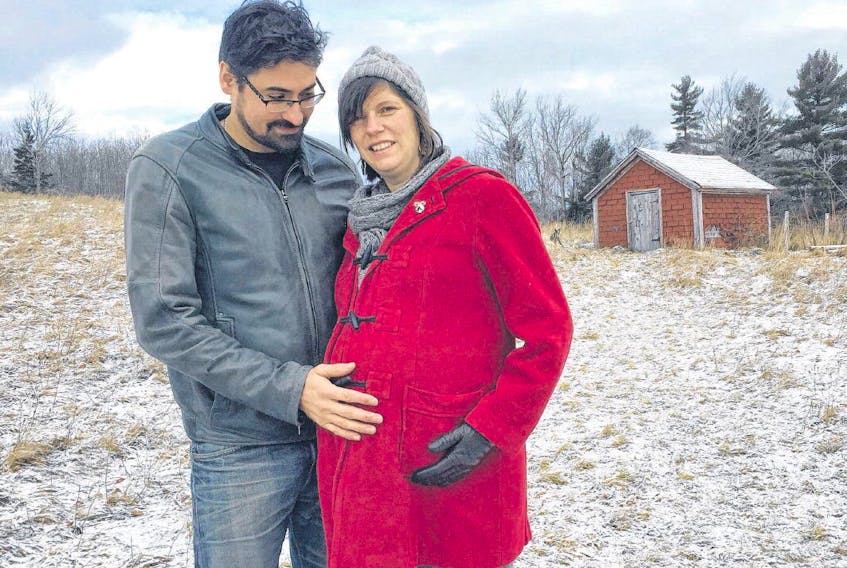It wasn’t only that Whitney Cruikshank’s midwife afforded her the dignity to give birth to her baby the way she wanted to — in the intimate surroundings of her own home.
It wasn’t just that her midwife was on call 24-7 and monitored every stage of her pregnancy so closely that she would arrive at Cruikshank’s Middle New Cornwall doorstep, if need be.
“It was that it was so empowering,” recalled Cruikshank of the experience of going through her second pregnancy under the care of a midwife two-and-a-half years ago. “By the end of it I was thinking, ‘yes, I’m a woman, I’m a mother, I can do this.’ It was through that midwife connection that I built up a confidence, a trust in myself that I could handle giving birth to my own child on my own.”
Cruikshank was halfway into her third pregnancy when she learned last week she’d be losing her midwife. The Nova Scotia Health Authority has suspended the South Shore Community Midwives Program. Cruikshank and the 21 other pregnant mothers who had been in the program are now being assigned family doctors in Bridgewater, according to health authority spokeswoman Kristen Lipscombe.
Lipscombe wasn’t able to say when the service would be up and
running again. The service includes two midwives. She said one is currently on leave and the other is taking some well-earned time off. Lipscombe also said the health authority is in the process of trying to recruit one more midwife to serve the South Shore area.
Cruikshank (who’s employed as a doula, providing pre- and postnatal care to families in the area) says the real reason why the system had been halted is because neither midwife was adequately supported by the province.
The news is devastating to many of those mothers, especially ones lacking a local support network to help them through pregnancy, she said. She also believes the lack of pre- and post-natal services available to women in the province illustrates a larger problem: that women’s health care isn’t deemed a top priority.
“It certainly is not a high priority. Midwives in this province are not being supported by our government despite all the wonderful work they do; the convincing evidence and outcomes that have accumulated over the years. It’s not that they’re not in demand.”
Midwives (who must complete a four-year baccalaureate program) can provide care before, during and after low-risk pregnancies. They work within a medical community, including family physicians, nurse practitioners and obstetricians, and make it possible for delivery to be done at home. They can also offer counselling and perform a host of medical procedures such as physical examinations, prenatal tests and blood work. But it’s the oneon- one intimacy, the around-theclock availability they can provide pregnant women that makes them so attractive to some.
In 2011, the Nova Scotia government paid for a 22-page review of the province’s midwife program, which advised that the program needed beefing up and was on the verge of collapse. Authored by four experts in primarymaternity care, the report advised the province to nearly triple its midwife staffing levels, fromseven at the time to 20 by 2017. The report also suggested the program be extended beyond the Halifax, Antigonish and South Shore areas and into Annapolis Valley
and Cape Breton.
The program has not expanded to date and since the authoring of the report only the IWK program has seen an increase in staffing, albeit meagre, to five midwives from three. Both Antigonish and the South Shore (before the program was suspended) areas haveremained at two.
The report also said that current staff were overworked, under- supported and often not provided the opportunity to participate collaboratively with family physicians and obstetricians.
“In our view midwifery in Nova Scotia cannot long survive in its present state. If nothing is done, the profession will collapse and the benefits of regulation will not be realized. There are too few members to meet increasing requests for midwifery care, provide services safely and effectively, and attend to the complexity of regulatory and professional association activities that are required of a newly regulated profession,” the report said.
“Women and infants are often the most disadvantaged members of marginalized groups. Midwifery care offers opportunities for relationship building, health education and participatory decision- making that can build confidence and trust with professions and health-care systems.”
Sarah Storm is due to give birth to her first baby any day now, and last Thursday she was informed she’d be losing her midwife. That meant her and her husband’s plan of delivering their baby at home in Auburndale abruptly ended.
But Storm said she saw the writing on the wall several weeks ago when the first midwife shewas assigned at the beginning stages of her pregnancy went on sick leave, leaving the remaining one responsible for the entire region.
Both midwives, she said, served invaluable support roles, preparing her emotionally and physically for delivery and beyond. Neither Sarah nor Jason have family in the province.
The province’s decision to suspend the program has left her angry but also concerned about the current state of a program
that she considers essential, and one she believes should be accessible to all pregnant mothers in the province.
“The work they do results in favourable outcomes but because they’re very accessible, they can do home visits. People can be in marginalized situations for different reasons and, if travel is harder for them because they don’t have a vehicle, this makes getting access to proper care easier. I’m thinking single moms, people who don’t have support around them that pregnant mothers need.
“All I need is someone caring to guide me. What it takes to deliver a baby is very similar to conditions it takes to make a baby: privacy, intimacy, relaxation. Those things don’t describe a hospital setting to me.”
The care midwives provide in the six weeks after delivery is critical, Storm argues. It’s during this period that some mothers struggle with breastfeeding and postpartum depression. Midwives can catch those symptoms and address it early.
Storm has been referred to an obstetrician in Bridgewater. They are not expecting the same intimacy of care. But beyond that, they say an already strained healthcare system will be more compromised with a sudden influx of pregnant mothers.
Jane Sandall of King’s College in London co-authored a 2016 study comparing midwife-led and other models of care from 15 trials involving more than 17,000 women with both low and increased risk of complications. When midwives were the main providers of care, women were less likely to give birth before 37 weeks.
Women also had fewer epidurals, fewer surgical incisions to reduce the risk of a tear. Most studies also reported higher levels of maternal satisfaction in midwife- led models.
The conclusion of the study was clear.
“Most women should be offered ‘midwife-led continuity of care,’” it stated. “It provides benefits for women and babies and we have identified no adverse effects.”









